The EU-Mercosur trade agreement has landed at a particularly heightened moment in European politics.
Even in the throes of his political agonies this week, President Emmanuel Macron was issuing a statement saying the deal in its current form was "unacceptable".
The new European Commission is therefore getting underway with a bang with street demonstrations by farmers and environmental groups expected on Monday and the divisions between member states, and between individual sectors within member states running deep (Italy's agriculture minister opposes the deal while its foreign minister supports it).
The European Commission believes this is the moment to defend and enhance the global rules-based trading order, right before a new Trump administration sets about detonating it.
An EU-Mercosur pact would bring together the combined markets of 780 million people, would be the biggest trade deal either side has entered into and would be based on established global trade rules.
Officials are at pains to stress that EU farmers can benefit from the deal, as well as face hardship.
The agreement will slash tariffs of between 10%-35% on EU cheese and other dairy products, wine, spirits and chocolate; Mercosur countries will also remove duties from more than 90% of EU imports, including the 35% duty on cars as well as tariffs on parts, machinery, chemicals and pharmaceuticals.
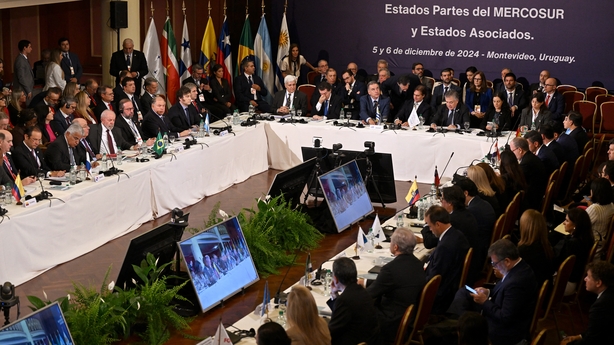
The EU will cut duties from all Mercosur industrial goods over a ten year period.
There are bilateral arrangements to reduce taxes for companies in Brazil exporting critical raw materials to Europe, which the EU currently has to source from Russia and China.
Officials say nickel, copper, aluminium, steel and titanium are all needed for the Green transition.
The trade agreement has been 25 years in the making.
Talks began in 1999 and after progress slowed were revived under the Juncker Commission in 2016.
Both sides reached agreement in 2019 in principle but due to fierce opposition from member states, the European Parliament, farmers and environmental groups - it was not ratified.
The return of Brazil’s Lula Da Silva in 2022 revived the deal a second time, and officials from both sides have been locked in negotiations for the past eight months.
This time, the European Commission says it’s a different trade agreement since it includes a fresh sustainability protocol covering environmental and agricultural safeguards.
This includes a commitment by both sides complying with the Paris Climate Accord of 2015, a feature that so far only exists in the EU’s trade agreements with the UK and New Zealand.
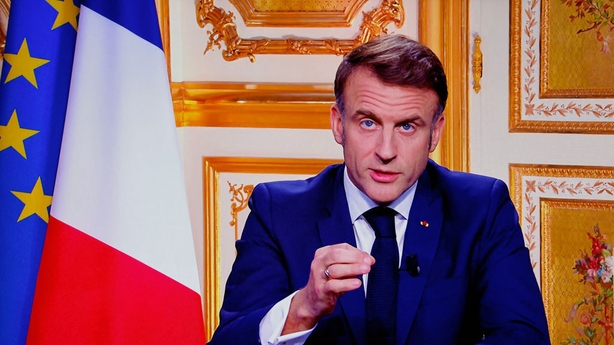
Officials say the agreement contains, for the first time, a legally binding commitment to halting deforestation from 2030.
Until now, there have only been political declarations to that effect.
The EU’s deforestation regulation, which will ban commodities harvested from deforested lands, will kick in next year, albeit following a year’s delay.
European environmental organisations have been quick to dismiss the changes.
The IFA says the deal would grant market access for 99,000 tonnes of beef and 180,000 tonnes of poultry, both at a zero-tariff rate, which could "decimate" both the Irish and EU beef and poultry sectors, displacing some 18pc of current EU production, especially in high-value cuts like steak.
"Ireland would be most impacted by this displacement given we are the largest exporters of beef within the EU," according to an IFA information note.
"To put it in context, the proposed 99,000 tonnes of additional beef from Mercosur countries is equivalent to about 22% of Ireland's total annual beef exports."
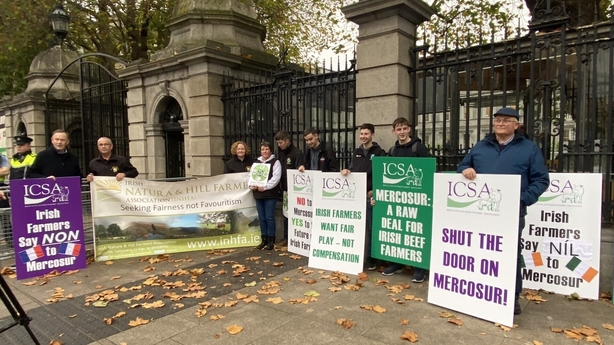
A senior EU official says beef imports are not tariff-free.
"These 99,000 tons will not be zero [tariff]," says the official.
"There will be a reduced tariff rate of 7.5%. Furthermore, this quota is divided between fresh and frozen meat, with frozen meat amounting to 45,000 tons. This frozen meat has less value on the market."
The European Commissions points out that the 99,000 tonnes of beef represent just 1.6% of overall European beef consumption, while poultry imports would amount to 1.4% of consumption.
Furthermore, the Mercosur deal puts limits on imports of sensitive commodities such as beef, poultry, sugar and ethanol, and that if there are any sectors badly affected the EU can apply safeguard measures.
"These (tariff) concessions are gradually phased in over seven years," said another EU official.
In response to long standing allegations by farmers and food safety campaigners about the use of hormones and other additives in Brazilian beef, the EU says it has tightened its own standards in recent years, and checks on additives in goods from outside the EU are carried out by member states themselves.
"A lot of this will depend on enforcement and on actual controls, where we will remain very vigilant in order to make sure that there are no compromises on our standards" says an EU official.
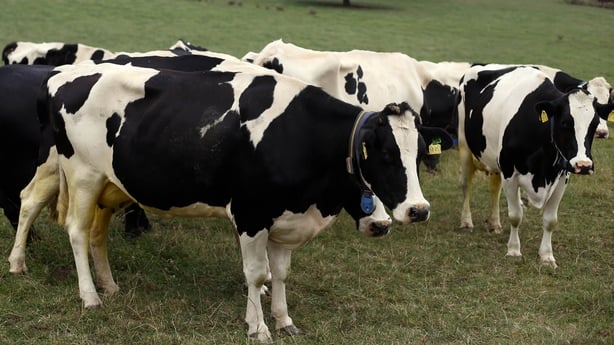
"That is in our hands and something we will try to address cooperatively with the Mercosur countries."
The IFA points out, however, that the Commission’s own most recent audit looking into hormone residue found that controls to ensure Brazilian female cattle meat destined for the EU market was free of one particular hormone were "ineffective" and that Brazil’s food safety authorities could not guarantee "the reliability of operators’ sworn statements" on the issue.
A European Commission spokesperson said there was a ban on hormone-treated beef entering the EU and it was up to third countries to comply with the ban.
"On the occasion of an audit performed by the Commission in 2024, it became clear that the Brazilian control system is not as strong as we would have wished. The Commission therefore made recommendations to improve it."
"It is up to Brazil to remedy the situation and take the necessary actions to address the Commission's recommendations," the spokesperson added.
Would the EU-Mercosur deal benefit other sectors of the Irish economy?
Ireland currently exports €555.7 million in goods and services to Mercosur countries - Brazil, Argentina, Paraguay, Uruguay and Bolivia - and imports €596.7 million in goods.
An impact assessment of the 2019 agreement commissioned by the Department of Enterprise Trade and Employment (DETE) found that Irish exporters have had a foothold in the Mercosur market since 2010 but the geographical distance and the low-purchasing power in Latin America made it difficult for Irish exporters to remain competitive.
A trade deal would help that foothold "grow over time", says the report, boosting exports by 17%, especially in chemicals, pharmaceuticals, electronics and optical products, electrical equipment and machinery, processed foods and beverages such as whiskey.
The report found that a Mercosur deal would provide "good prospects for Irish companies to diversify and enhance the resilience of their market base over the longer term."
The deal agreed was signed in principle.
If Italy can be tipped over to their side, the deal would be in trouble
The European Commission now has the arduous task of getting the agreement of member states and European Parliament.
The first step will be the legal "scrubbing" of the agreement followed by the official translation into 23 EU languages.
It is expected the Commission will then fast-track the core trade deal, meaning it would need a qualified majority of member states, i.e., 15 countries representing at least 65% of the EU population, plus the support of the European Parliament.
Blocking the deal would require at least four member states representing more than 35% of the EU population.
The French government and National Assembly, as well as much of civil society and the farming sector, are against the deal, Poland and Austria are also opposed, while the Netherlands and Italy have expressed reservations.
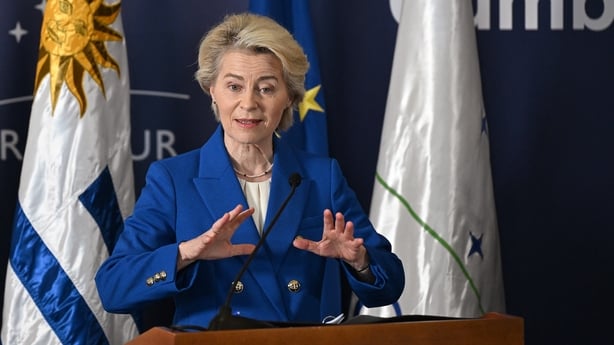
Germany, Spain and other automotive giants are desperate for the deal to go ahead, given the fall off in sales to China and the threat of tariffs when Mr Trump enters the White House in January.
They joined Portugal, Sweden, Denmark, Finland, Croatia, Estonia, Latvia, Luxembourg and the Czech Republic in urging the European Commission in September to successfully conclude negotiations.
"The conclusion of this deal will contribute to strengthening the global competitiveness of European automobile manufacturers by eliminating high tariffs and addressing technical barriers to trade in their exports to the Mercosur market," said Sigrid de Vries of the European Automobile Manufacturers’ Association (ACEA).
"This positive news comes at a pivotal moment for the automotive industry, which is currently facing critical challenges in the transition towards decarbonisation."
France will now start to rally resistance. Together with Austria, Poland and the Netherlands that would bring the figure to 30%.
If Italy can be tipped over to their side, the deal would be in trouble.
It will make for a bruising 12 months.
Read more stories from throughout Europe
Both Emmanuel Macron and Olaf Scholz, the German Chancellor, have their own compelling political reasons for fighting their respective corners.
However, they are on opposing sides.
The experience of TTIP, the ill-fated EU-US trade agreement, is a reminder that once interest groups become thoroughly convinced that a deal is utterly inimical to their livelihoods, then there is very little persuasion to be had.
Senior EU negotiators made it clear that after 25 years the deal has been concluded and cannot be re-opened.
What is different now compared to TTIP is that Donald Trump is threatening to demolish global trade flows through aggressive tariffs and an America First orthodoxy.
The European Commission believes that a comprehensive trade deal between a set of democracies, however imperfect, with deep cultural ties, will keep the beacon of free trade glowing.
The Mercosur countries too believe that the deal will also keep China at bay.
But the cost in terms of popular anger at home, including the prospect of widespread and violent protest by farming organisations, cannot yet be measured.







